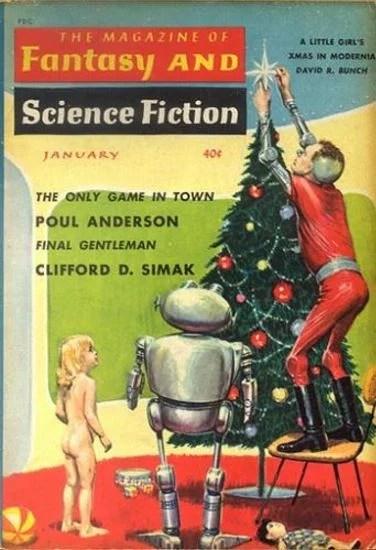
With Astounding so good this month, I suppose it was too much to ask that Fantasy and Science Fiction would also be of high caliber. While it's not a bad issue, it's not one of the better ones, either.
Charles Henneberg (who I understand is actually a Parisian named Nathalie) has the best story of the bunch, The Non-Humans, translated by Damon Knight. This is the second story the team has published in F&SF, and it is far better than the previous one. It's a lovely historical tale of an Italian renaissance painter and the androgynous alien with whom he falls in love. An historical personage has a supporting part; his identity is kept secret until the end, though the half-clever can deduce it before finishing.
Britisher H.F. Ellis offers up Fireside Chat, a reprint from Punch. It involves a haunted house and leaves the reader wondering just who are the ghosts, and who are the current residents?
I know many of my readers are Howard Fast fans, but his latest, Cato the Martian is not among his best. For the past fifty years, the Martians have listened to our radio broadcasts and watched our television programming with avid interest and increasing concern. A certain Martian lawmaker, nicknamed after the famous anti-Carthaginian Roman, concludes each speech with "Earth must be destroyed!" until, finally, he gets his comrades in litigation to agree. The ensuing war does not turn out well for the dwellers of the Red Planet.
It's not really science fiction. If anything, it's perhaps the other side of the coin to Earthmen Bearing Gifts, in which the Martians eagerly await the arrival of their Terran neighbors, but with a similar ending.
The Swamp Road, by Will Worthington, is an interesting After-the-Bomb piece about a community held together by a bitterly strict Christian doctrine a la Salem, Massachusetts. Every so often, one of the citizens changes, developing a second eyelid and otherwise adapting to a dessicated, alien world. When the change happens to the storyteller and his love, they are forced out of the village and must learn the true nature of their metamorphosis. It's a good, atmospheric yarn, though I feel it could have been longer. Some subjects deserve more than just a taste.
Some, on the other hand, don't deserve the space. Slammy and the Bonneygott is the story of an alien child who crosses dimensions in a tinker toy spaceship and plays with a few children for an afternoon. It was apparently written by a neophyte named "Mrs. Agate," and the plot was provided by her six-year old son. One can tell.
Avram Davidson has two settings: amazing and passable. The Sixth Season is a passable story about a small crew of humans stuck on an anthropological expedition to a backwoods alien-inhabited world for 200 days. They endure five miserable seasons–can they survive the sixth?
It reminds me of my days growing up in the desert community of El Centro. I used to lament that we had four seasons like everyone else, but they were Hot, Stink, Bug, and Wind. That's not being entirely charitable, of course. We had a balmy Winter, too. For about two weeks.

Asimov's column this month is Bug-eyed Vonster. No, it has nothing to do with aliens; it's how the good Doctor remembers the term BeV. It is an abbreviation for "Billion electron Volts," a unit of electric energy commonly encountered when discussing cosmic rays and atom smashers. I learned what Cerenkov radiation is (the radiation given by particles going faster than the speed of light in a given material).
Cliff Simak's The Golden Bugs takes up most of the rest of the book. This time, he trades the poetic farmlands for the prosaic suburbs for the story's setting. A swarm of extraterrestrial crystal turtle-beetles ride into town on an agate meteorite and begin to wreak havoc on an average American family. It's fun while it lasts, but it ends too abruptly, and there isn't much to it. It's the sort of thing one cranks out between masterpieces.
Finally, there is the nigh impenetrable Beyond Ganga Mata by John Berry, a space-filler originally published in The Southwestern. A fellow travels to India, meets a holy man, journeys for a year, and meets him again. Perhaps it was simply the lateness of the hour, but had the story not been blessedly short, I'd have had trouble finishing the magazine.

For those who like to keep score, this issue of F&SF was, depending on how you average things, earned between 2.78 and 2.88 stars. Compare that to Galaxy, which got between 3 and 3.13 stars, and Astounding, which earned exactly three stars even.
Though it could be argued on the numbers that Galaxy was thus the better magazine, and it was certainly the biggest, I'm going to give the June 1960 crown to Astounding. All of the fiction was decent to very good, and it's not Janifer, Anvil, and Berryman's fault that Campbell wrote a stinker of a "science" article. Plus, Charley de Milo was the choice story for the month.
Continuing my analysis, this means that the Big Three magazines (counting Galaxy and IF as one) each took the monthly crown twice–all of them tied. And that's why I keep my subscriptions to all of them.
A more depressing statistic: there was only one woman author this month, and she wrote under a male pseudonym!

By the way, remember Sputnik 4? The precursor to Soviet manned space travel? Well, it looks like the Communists won't be orbiting a real person any time soon. In an uncharacteristically candid news announcement, the Soviets disclosed that the ship's retrorocket, designed to brake the capsule for landing, actually catapulted the craft into a higher orbit. It'll be up there for a while. Oh well.
See you soon with a book review!

















